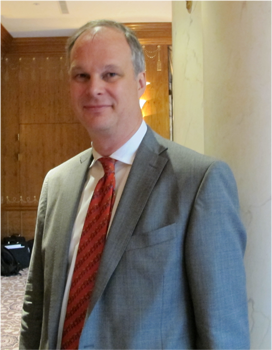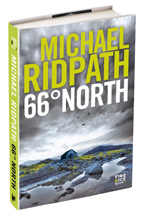It’s tricky, changing genres. People don’t like it. Publishers fret about losing the brand they have built up over the years, booksellers become confused, loyal readers are upset that the books are not what they expect. As an author you are forced out of your comfort zone. So when I made up my mind to change genres from financial thrillers to a crime series set in Iceland, it was a big decision.
 I had my reasons. My first book, Free To Trade published in 1995, was a success: a record advance for a first novel, number two on the bestseller lists for three months and translated into over thirty languages. I followed that up with seven more financial thrillers where I honed my skills as a writer. The books were getting better, but the sales were slowly falling. I was the country’s foremost financial thriller writer, but no one was buying financial thrillers.
I had my reasons. My first book, Free To Trade published in 1995, was a success: a record advance for a first novel, number two on the bestseller lists for three months and translated into over thirty languages. I followed that up with seven more financial thrillers where I honed my skills as a writer. The books were getting better, but the sales were slowly falling. I was the country’s foremost financial thriller writer, but no one was buying financial thrillers.
A common piece of advice for first-time writers, and a good one, is to write about what you know. This I had done for over ten years. But as I was honing my skills as a storyteller, I needed a new challenge. I realized I wanted to write about a subject on which I knew nothing.
So I decided to change genres. I visited my local WH Smith and realised that of the kinds of books I could write, two dominated the shelves: thrillers about lost manuscripts and ancient secret societies, and crime stories featuring distinctive detectives. I decided to go for the distinctive detective.
I came up with two possibilities: a good cop in a corrupt country – in this case a Saudi Arabian policeman – and an Icelandic detective. I had visited Iceland on a book tour, found it a fascinating country and vowed to write about it some day. I tried these two ideas out on friends. Everyone hated Saudi Arabia. To my surprise, most people were intrigued by Iceland.
I then faced a problem. I am not an Icelander, but I needed a detective who spoke Icelandic. My solution was Magnus, who left Iceland when he was twelve to go with his father to America. After his father was murdered, Magnus joined the Boston Police Department as a homicide detective. Ten years later he is seconded to Reykjavík as an adviser. This gives me the opportunity to write about Iceland through the eyes of a partial outsider, as well as providing my detective with all kinds of problems of his own.
Then, of course, I needed a plot. As part of my background research on Iceland I had read a couple of sagas, the medieval tales about the families of Viking settlers in the ninth and tenth centuries. I loved them – they reminded me of my days studying Anglo-Saxon history at university. And nothing could be further from mergers and acquisitions and multi-million dollar bond trades. So I constructed a plot around a lost saga. The result, Where The Shadows Lie, was finished nearly two years later.
I was concerned that publishers would be wary of re-launching my career, so I submitted the book under a pseudonym. I am glad to say that it was taken up by Corvus, and then by publishers in over twenty countries, including Iceland. Fortunately, Corvus were happy for me to drop the pseudonym and use my own name. Iceland played its part too: in a fit of geological attention-seeking pique it set off a volcano that disrupted the lives of tens of thousands.
But then my past came back to haunt me. The financial crisis hit Iceland very hard indeed. In the first draft of Where The Shadows Lie everything was expensive, in the second draft, everything was cheap. The crash of 2008, or the kreppa as they call it, was the biggest thing to hit Iceland since independence in 1944, and I couldn’t ignore it. But having spent years breaking out of the mould of financial-thriller writing I really didn’t want to go back to it and risk confusing everyone permanently.
So I decided to write about the victims of the crash, not its perpetrators. 66 North, my second Magnus book, is about a group of disgruntled Icelanders who meet at one of the many demonstrations held in Reykjavík after the crash, and decide to take revenge on those people who they believe caused it. I have managed to keep the financial detail out of the book, while showing the effects of economic disaster on ordinary Icelanders.
And as for the next book? You’ll have to wait and see. But Iceland is such an extraordinary country that I have no shortage of possible material.


Michael Ridpath is the author of 66 North, published by Corvus 1st May 2011
abortion pills
website abortion pill buy online
order abortion pill online
read here buy abortion pills online
reasons why women cheat on their husbands
online what to do when husband cheats
my husband cheated again
click my husband cheats
free prescription drug discount card
damske.com cvs online coupon
can i take motrin and tylenol
canitake.net can i take motrin and tylenol
bystolic coupon mckesson
site forest laboratories patient assistance
coupon for bystolic
read forest patient assistance
free prescription drug discount card
site cialis savings and coupons
back alley abortions
click abortion laws
what is abortion pill
akum.org about abortion pill
acetazolamide 250 mg tablets
acetazolamide acetazolamide blood brain barrier
naltrexone how long does it last
click ldn colitis
where can i buy low dose naltrexone
link naltrexone uses